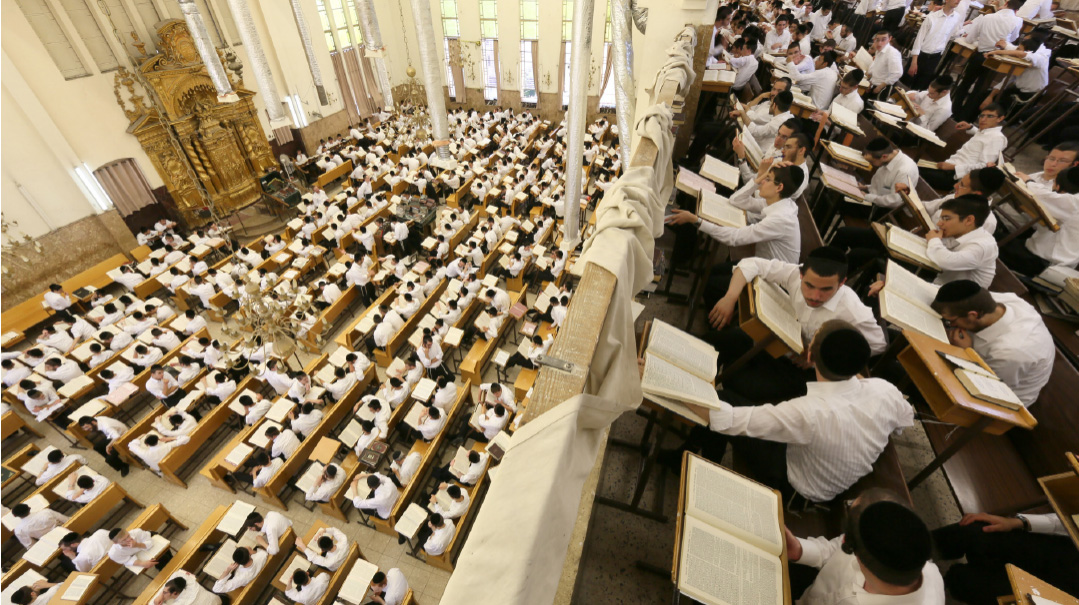Saar’s Juggling Act

Gideon Saar knows how to serve cold revenge, and not only to Netanyahu

AN unexpected pair arrived at the shivah house where the seven children of Chacham Shalom Cohen ztz”l, rosh yeshivah of Porat Yosef and founder of the Shas Party, were sitting last week.
Given Shas’s prominent place in the pro-Bibi bloc, naturally most of the politicians who came to pay their respects were members of the right wing, and so it was a surprise to see Defense Minister Benny Gantz, accompanied by Shas chair Aryeh Deri, and Justice Minister Gideon Saar, who came without any escort.
The two menachamim, Gantz and Saar, have joined forces for the next elections. The more interesting of the pair, who plays second fiddle on the list, is Gideon Saar — the man who was instrumental in helping Netanyahu return from opposition in 2009 to regain the position of prime minister. Somewhere along the way, the relationship soured; Netanyahu accused Saar of wanting to depose him, and Saar was compelled to leave the Likud and establish his own party.
Despite a poor showing in the last elections — Saar’s New Hope party won only six Knesset seats — Saar walked away the victor in that round. His party denied Netanyahu’s bloc a majority of 61, dispatching Bibi to the opposition benches for the first time in a dozen years. The prime minister’s residence no longer has the name Netanyahu on the mailbox.
Challenging Bibi from the right isn’t for the faint-hearted. Over the last year, Saar, a longtime loyal Likud member, was under constant attack from the big guns of conservative media, traditional and social. The bulls-eye on his back was second in size only to that of former prime minister Naftali Bennett, an even greater target of right-wing antipathy.
Unlike Bennett, who betrayed his constituency, promising in every interview (among others, to Mishpacha) that he would never sit in a government with Yair Lapid, Saar gave no such assurances. His only promise from the beginning was never to sit in a government alongside Netanyahu, and he has stood by that. None of this deterred the incessant bombardment from what Saar calls the “Poison Machine.”
Bennett, as we know, has vanished from the political map in Israel. Interior Minister Ayelet Shaked, who inherited his party, is in desperate straits; poll after poll finds her party hovering over electoral oblivion.
And the worst seems yet to come for Shaked. In closed-door discussions last week, Netanyahu said that the two seats that pollsters predict for her are from Likud voters. The implication was that the Likud campaign is set to attack Shaked to force her out of the race and bring those voters home.
Saar, considered one of the wiliest players on the political scene, has avoided that fate by joining Benny Gantz, minister of defense and former IDF chief of general staff, as number two on the latter’s party list. The pair have signed up Gadi Eizenkot, another former IDF chief of staff — someone Yair Lapid had tried to convince to join his party, Yesh Atid.
Current polls award the hybrid generals-plus-Saar party between 12 and 14 seats — fewer than the three had predicted when they joined together, but more than their rivals on either side hoped to see.
If the elections were held today, the stalemate between the blocs would continue, and Saar would be able to add another feather in his cap, as the man who denied Netanyahu a majority in two straight elections.
Until several weeks ago, Gantz and Saar represented a “Plan B” for the chareidim in establishing a government, but several challenges have now arisen. In spite of being himself shomer Shabbos, Saar recently declared his support for public transportation on Shabbos.
At the end of last week, sources in UTJ pointed fingers in his direction as the one who stood behind a move to introduce math and English into chareidi schools — a red-flag issue for much of the chareidi world.
Although the relationship has definitely cooled, the possibility of the chareidim working with Saar has not gone down the tubes completely. The chareidim remember him from earlier days, when his crucial political collaboration was well-appreciated.
As interior minister, he refused to approve a proposed Tel Aviv municipal ordinance allowing businesses to open on Shabbos to an almost unlimited degree. Deri, as head of Shas, who led the same ministry after him, was able to use the precedent of the decision of Saar, himself a resident of the secular bubble that is Israel’s high-tech commercial capital, known as “Medinat Tel Aviv.”
In the present government, the doors slammed shut in the face of the chareidim at almost all of the ministries, but Saar’s door remained open.
When Communications Minister Yoaz Hendel announced his plan for reform of the kosher cell phone market, an open provocation against chareidim, Saar, the head of his party, called him out for it.
“Just as you don’t want the chareidim mixing in with what happens in Tel Aviv, likewise you don’t need to get involved in what goes on in Bnei Brak,” said Saar to Hendel, who was left bitterly disappointed.
Saar knows how to serve cold revenge, and not only to Netanyahu. In the coming elections, Yoaz Hendel has been left off the list with Gantz, and he had to scramble to find a place in Ayelet Shaked’s party. According to polls, the two of them are far from assured a place in the next Knesset.
In his meeting with the rabbanim, led by the Vizhnitzer Rebbe, who came to his office in an attempt to persuade him to back off from his plan regarding the phones, Hendel declared outrageously, “My wagon is full.” He was alluding to the halachah that one driving an empty wagon must make way for a full one — the famous example the Chazon Ish ztz”l cited during his meeting with the first prime minister Ben-Gurion. In retrospect, it appears that the fellow put the cart before the horse.
(Originally featured in Mishpacha, Issue 926)
Oops! We could not locate your form.







